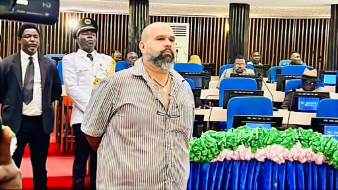Failure to Review the Pump Price of Fuel… NPRA Boss Resorts To Carol-Singing

By Kelvin Jay
Despite recent voluntary reductions in fuel pump prices by oil marketers, the National Petroleum Regulatory Agency (NPRA) has failed to take decisive action to ensure these reductions benefit ordinary citizens — particularly in the transport sector.
Instead of reviewing and officially adjusting the national fuel pricing structure, the NPRA has resorted to singing praises about creating a so-called “competitive downstream sector.” This self-congratulatory campaign is nothing but cheap propaganda aimed at deceiving the public. Rather than taking meaningful steps to enforce reductions that could lead to lower transport fares, the Agency continues to hide behind the excuse of market liberalization.
When fuel prices increase, NPRA Director Baluwa is quick to remain silent about competition or deregulation.
He never sings the “Carrol song” of open-market policies. But now that fuel prices have dropped — thanks to oil marketers — he conveniently shifts the narrative, claiming the downstream sector “reacts based on market dynamics” under the policies he designed.
Instead of addressing the real issues affecting transport costs, Baluwa is busy blowing his trumpet about so-called “gains” in the downstream sector. Meanwhile, the impact of fuel price reductions has not reached the people who need it most.
Transport fares from Freetown to Kono, Makeni, Kailahun, Pujehun, Bonthe, Bo, and Kenema have remained unchanged — despite the lower fuel costs. This failure to reflect reduced prices at the pump in everyday transport fares shows a complete disconnect between the NPRA’s policies and the reality on the ground.
The NPRA must do the needful.
Fuel price reductions mean nothing if they don’t bring relief to the people. The agency must go beyond public relations and take real regulatory action to ensure that lower pump prices translate into lower transport fares. Anything less is a betrayal of public trust.
Fuel Price Reduction-a ‘Dead on Arrival’
Many citizens have described the recent fuel price reduction as “dead on arrival”, arguing that it has brought no tangible benefit to the masses. Despite the drop in pump prices, the cost of living remains high, and transport fares continue to soar.
It is important to emphasize that petroleum products are a primary driver of prices across all sectors of the economy. Whenever fuel prices increase, the ripple effect is felt across the board — especially in the prices of essential goods and services.
Speaking to Voice of Salone Newspaper, traders selling provisions in Freetown expressed deep dissatisfaction with the exorbitant transport costs they continue to face when moving goods from wholesale markets to their shops.
“We sometimes spend far beyond what we budgeted for,” said Aminata Bangura, a provision seller at Sani Abacha Street. “To recover our transport expenses, we are forced to increase the prices of our goods. It’s the only way to survive.”
This situation highlights the disconnect between policy and impact. While fuel marketers have lowered pump prices, the lack of enforcement by regulators means those reductions are not reflected in transport fares or commodity prices — leaving ordinary citizens to bear the brunt of high costs.
Until meaningful action is taken to ensure fuel price drops result in reduced transportation costs, any so-called “relief” remains a theory on paper, not a reality for the average Sierra Leonean.





